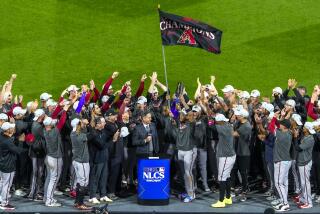Diamondbacks’ Ian Kennedy is ready, no doubt about it
- Share via
His success was never going to last. Not with that fastball. Not with that frame.
Wait until Ian Kennedy gets to college, the skeptics yammered. Then we’ll see how dominant a 6-foot right-hander whose pitches top out in the low 90s can be.
Dave Demarest believed otherwise. Kennedy’s coach at Westminster La Quinta had seen the slight kid endure only two bad innings in four years of high school.
Demarest figured his ace would have cards to play at USC and beyond based on his poise, mound presence and fastball command.
“Those three things can take you places,” Demarest said.
Can they ever.
The pitcher who went on to forge an All-American career with the Trojans will take the mound Saturday as the unquestioned ace of the Arizona Diamondbacks in Game 1 of the National League division series against the Milwaukee Brewers.
“Without Ian and what he’s done this year for this club,” Diamondbacks pitcher Joe Saunders said, “we’re not in the same position we are right now.”
Arizona won the NL West for the first time since 2007 largely because Kennedy enjoyed so many firsts in his second full major league season. There was his first opening-day start. His first child was born in April, followed a day later by his first career shutout.
The most uproarious first came when his teammates gave him a standing ovation in the Chase Field clubhouse Sept. 19 after he notched his 20th victory.
“It’s been kind of a long joy ride,” said Kennedy, 26.
It was one even his biggest supporter doubted he was capable of making this early in his career.
When he went a combined 18-6 in his first three minor league seasons but then 0-4 in his first extended stint with the New York Yankees in 2008, uncertainty took up residence even in the Kennedy household.
“I can’t say it didn’t cross my mind to wonder if he was one of those guys who was a great minor leaguer but not good enough for the big leagues,” said Sean Kennedy, Ian’s father.
Demarest also worried about his former star in August 2008 when Kennedy’s fastball didn’t even touch 90 mph during a start against the Angels. (The dip in velocity would later be tied to an aneurysm in Kennedy’s armpit.)
But Demarest said he has long believed Kennedy possessed what he needed to make it on baseball’s biggest stage.
“He just has that ‘it,’” Demarest said, “whatever ‘it’ is.”
Sean Kennedy credited sports psychology consultant Ken Ravizza for instilling in Ian the ability to move on after bad games. Ian developed his cool, his father said, as a teenager on fields throughout Southern California while pitching for the West Covina Dukes travel team.
“Those guys would win a big game and they would walk off the field like it was nothing,” the elder Kennedy said. “They expected it. He was in many big games before he got into high school. His mental game was grown at an early age.”
It continues to flourish with the Diamondbacks. Of course, given that Kennedy this season was the NL co-leader with 21 wins and among the best in the league with 198 strikeouts, a 2.88 earned-run average and 222 innings pitched, there was no reason for self-doubt.
“He’s very confident,” Diamondbacks Manager Kirk Gibson said. “I mean, why wouldn’t he be? He’s got great stuff. We talk about keeping our composure a lot, and he’s certainly a guy who’s very good at that.”
Arizona General Manager Kevin Towers described Kennedy as “one of those slow heartbeat guys” in pressure situations, likening him to pitching greats Greg Maddux, Mariano Rivera and Trevor Hoffman because of his unflappability.
Even after Kennedy’s slow start with New York, the Diamondbacks remained believers who targeted him in the December 2009 trade that sent Curtis Granderson to the Yankees as part of a three-team, seven-player deal.
“He knew there was going to be a lot of patience,” said Towers, who was hired nine months after Kennedy became a Diamondback. “He came over in a major deal and was going to get the ball every fifth day.”
Sean Kennedy was with his son when he learned he was headed to Phoenix.
“We were all grinning from ear to ear knowing that that’s what he needed,” Sean Kennedy said, “an opportunity without having someone looking over your shoulder.”
Ian Kennedy never complained about the pressure of playing in New York and said he did not feel like the Yankees gave up on him, calling the move “another step, another destination” in his fledgling career. His first season with the Diamondbacks had some missteps, when he went 9-10 with a 3.80 ERA for a team that finished last in its division.
Kennedy’s statistical transformation this season is as startling as his team’s worst-to-first turnaround, though he said he is largely the same pitcher. He attributes much of his success to the Diamondbacks’ acquisitions of closer J.J. Putz and setup man David Hernandez, who have combined to convert 56 of 63 save opportunities.
Consistency has also been one of Kennedy’s hallmarks; he has not lost back-to-back starts and along with the Dodgers’ Clayton Kershaw is a leading candidate for the Cy Young Award.
“His fastball command has been off the charts,” said Charles Nagy, Arizona’s pitching coach. “He’s pitched off that and had great success.”
Anyone wondering whether the playoff rookie will be rattled should check his red beard for flecks of gray considering his history of big-time debuts.
Start with his first high school pitching performance: a complete-game victory.
In his first college start, Kennedy took the mound opposite Long Beach State’s Jered Weaver and gave up one hit in five innings.
His major league debut, in the baseball cathedral that is Yankee Stadium, seemed like pinstriped providence. Kennedy held the Tampa Bay Rays to one earned run in seven innings to record the victory.
So Kennedy doesn’t figure to cower against the Brewers and sluggers Prince Fielder and Ryan Braun.
Said Demarest: “He’s been put in that position at every level.”
Said Mike Gillespie, his former coach at USC: “I don’t think he will be intimidated by it.”
No matter what anyone else has to say.
More to Read
Go beyond the scoreboard
Get the latest on L.A.'s teams in the daily Sports Report newsletter.
You may occasionally receive promotional content from the Los Angeles Times.











